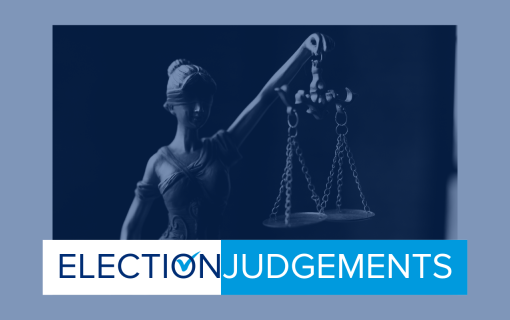Noted Republican, Democrat Reflect on U.S. Elections
On the morning of November 6, 2012 – Election Day in the United States – Peter Kelly, IFES chairman and former Democratic National Committee finance chair, and Frank Fahrenkopf, co-chair of the Commission on Presidential Debates and former chairman of the Republican National Committee, joined IFES President and CEO Bill Sweeney for a briefing on the U.S. election system at the historic National Press Club in Washington, D.C.
Speaking to participants of IFES’ 2012 U.S. Election Program, the political insiders provided their perspective on the American electorate, campaign strategies and the electoral process in the country. They also took questions from the audience, which was composed of hundreds of elections officials, practitioners and experts from around the world.
Now, following up on that Tuesday morning conversation, Kelly and Fahrenkopf offer their thoughts on the election results and the lessons learned from this past electoral cycle.
Looking back at the run-up to the election, what do you think worked and didn’t work for your party and how it handled its candidates’ campaigns? What are some of the lessons learned?
Fahrenkopf: The Republican campaign was beset by many problems – chief among them, a lackluster voter-turnout operation. The president was re-elected with 9 million fewer votes than he received in 2008; however, Romney received 2.5 million fewer votes than McCain received in 2008. The GOP failed to get out its base, and that led to defeat, particularly with the large number of minority voters targeted by the Democrats.
Additionally, the Romney campaign waited too long to respond to the Obama campaign’s tactic of defining Romney before he could define himself.
Kelly: The hateful part of the recent campaign was the almost total reliance on negative ads and negative campaigning. Both sides were guilty of excessive use of this technique, and it left the voting public even more cynical when it was over. Given the proven impact of such negative campaigning, it is not likely that it will stop anytime soon.
What worked for Obama was an intensive, highly sophisticated pursuit of voter identification and motivation – a process that went on for over a year and, in the case of the critical states, more than two years. The ground game, as we call it, was the difference.
At the Election Day breakfast briefing, you shared some of your perceptions about what lay ahead for both campaigns. How did these perceptions coincide with the end result of the election?
Fahrenkopf: The perceptions I mentioned in my remarks were mirrored by the actual result – the key states of Ohio, Florida and Virginia determined the result, and the campaign with the best voter turnout program won.
Kelly: I believe my forecast – whether fairy-tale or not, was exact. My belief was that Ohio was absolute (given that Obama’s staff moved forces to Iowa on the Saturday before Election Day) and that Florida and Virginia – the toughest to predict – were subject to an awesome ground game. So, other than North Carolina, I expected the remaining ten swing states to go Obama’s way.
In your work and travels to countries around the world, you have had the opportunity to observe different electoral systems. What makes the American electoral system different and unique?
Fahrenkopf: The American electoral system is grounded in free speech, free press, free labor unions and the sanctity of every vote. Each nation must adopt a democratic model that is consistent with its culture and mores. Our system works for us because of our history; however, it probably would not work elsewhere. As a model for other countries, our system should be viewed to ascertain what elements of our system might be transferable, with the principal goal being a system that will result in a peaceful turnover from the party in power when it is defeated at the ballot box.
Kelly: Americans view the electoral process as a given – a reliable, generally honest process on which they can rely. The greatest challenge our system faced in modern times was the Florida recounts in 2000 and the multiple court actions that seemed to go on endlessly. And, finally, when the U.S. Supreme Court basically overruled the Florida state courts – a first assertion of federal authority over state-run election systems – Albert Gore simply swallowed hard and conceded victory to George Bush. In other countries, conflict of a very unpleasant kind might have ensued after such unusual and unprecedented action by the Supreme Court.
Based on your experience, what do outreach programs like IFES’ USEP do for democratic practices around the world?
Fahrenkopf: We can all learn from each other, and IFES’ U.S. Election Program affords the opportunity for democrats around the world to share best practices to improve existing systems. The work of the Commission on Presidential Debates is a perfect example of means that can be effective in educating voters across the world.
Kelly: The magic of IFES’ work is its ability to provide strong guidance on ultimate principles of electoral integrity without overpowering each nation’s culture and political process. IFES understands that democracy in Detroit and Ann Arbor are two very different things and that rule applies to the nations we serve.
What were some of your impressions of the USEP? Did you get a chance to speak to any of the participants? Do you have any anecdotes?
Kelly: I spoke with four or five dozen participants and found them grateful, enthusiastic and informed. It is a pleasure to work with those who participated in the program. We are raised by their faith and enthusiasm.









